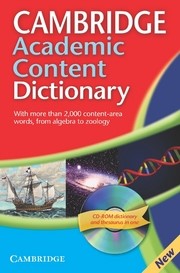Cambridge Academic Content Dictionary

The ‘academic content’ referred to in the title of this dictionary is the vocabulary of high school (and possibly college) courses in the US and Canada. Entries cover more than 2,000 content-area items, as well as general academic vocabulary, like optimal, salutary, and threshold (from the Academic Word List). Content areas include all typical high school subjects, from algebra and earth science to literature and world history. For example, the terms defined in connection with algebra are degree, dependent variable, factor, factoring identity, imaginary number, independent variable, intersection, irrational number, and linear equation.
That all sounds highly plausible, but when I actually tried to (ahem) refresh my memory on the term irrational number, I read: “a number that cannot be expressed as the ratio of two whole numbers”. No examples. If students really didn’t know what an irrational number was, wouldn’t they need more help than this? I did. So I turned to Google and found a great website that explained everything with lots of examples.
Besides containing academic content and function words, the dictionary also includes informal words and phrases that students may meet outside class, such as jabber, jeez, and kaput.
A CD-ROM, which comes with the dictionary, allows students to search for vocabulary by subject area. It also includes a clear audio of all entry words, offers word family information, and has a thesaurus and instant look-up feature, called QUICKfind, which looks up any words at which a cursor is pointed in documents, emails, and web pages.
Who is likely to buy the Cambridge Academic Content Dictionary? I can think of at least two sets of target customers. The first group is students studying for the US university English exam, TOEFL – especially students from Asia, who often have trouble figuring out English word meanings because they don’t know any other European language. There may actually be a fairly large market here.
The second group of potential buyers are exchange students from anywhere in the world planning to attend a North American high school or college.
All in all, the dictionary looks attractive and easy to use (especially the CD-ROM). Unfortunately, its definitions may not have enough explanatory depth for academic users.
Heather Murray
